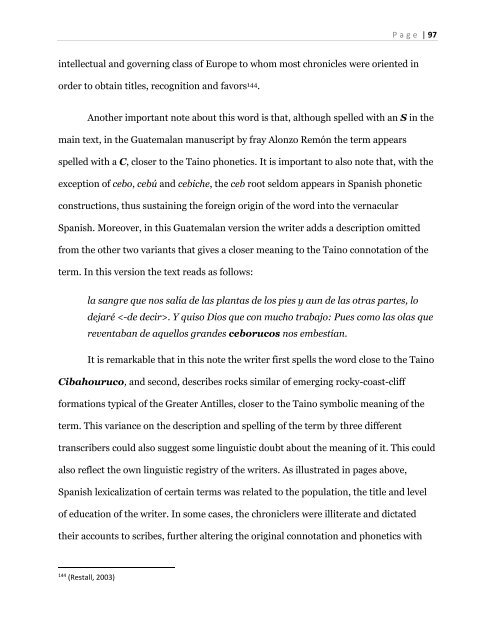Language of the Voiceless: Traces of Taino Language, Food, and Culture in the Americas From 1492 to the Present
by Leonardo Nin
by Leonardo Nin
You also want an ePaper? Increase the reach of your titles
YUMPU automatically turns print PDFs into web optimized ePapers that Google loves.
P a g e | 97<br />
<strong>in</strong>tellectual <strong>and</strong> govern<strong>in</strong>g class <strong>of</strong> Europe <strong>to</strong> whom most chronicles were oriented <strong>in</strong><br />
order <strong>to</strong> obta<strong>in</strong> titles, recognition <strong>and</strong> favors 144 .<br />
Ano<strong>the</strong>r important note about this word is that, although spelled with an S <strong>in</strong> <strong>the</strong><br />
ma<strong>in</strong> text, <strong>in</strong> <strong>the</strong> Guatemalan manuscript by fray Alonzo Remón <strong>the</strong> term appears<br />
spelled with a C, closer <strong>to</strong> <strong>the</strong> <strong>Ta<strong>in</strong>o</strong> phonetics. It is important <strong>to</strong> also note that, with <strong>the</strong><br />
exception <strong>of</strong> cebo, cebú <strong>and</strong> cebiche, <strong>the</strong> ceb root seldom appears <strong>in</strong> Spanish phonetic<br />
constructions, thus susta<strong>in</strong><strong>in</strong>g <strong>the</strong> foreign orig<strong>in</strong> <strong>of</strong> <strong>the</strong> word <strong>in</strong><strong>to</strong> <strong>the</strong> vernacular<br />
Spanish. Moreover, <strong>in</strong> this Guatemalan version <strong>the</strong> writer adds a description omitted<br />
from <strong>the</strong> o<strong>the</strong>r two variants that gives a closer mean<strong>in</strong>g <strong>to</strong> <strong>the</strong> <strong>Ta<strong>in</strong>o</strong> connotation <strong>of</strong> <strong>the</strong><br />
term. In this version <strong>the</strong> text reads as follows:<br />
la sangre que nos salía de las plantas de los pies y aun de las otras partes, lo<br />
dejaré . Y quiso Dios que con mucho trabajo: Pues como las olas que<br />
reventaban de aquellos gr<strong>and</strong>es ceborucos nos embestían.<br />
It is remarkable that <strong>in</strong> this note <strong>the</strong> writer first spells <strong>the</strong> word close <strong>to</strong> <strong>the</strong> <strong>Ta<strong>in</strong>o</strong><br />
Cibahouruco, <strong>and</strong> second, describes rocks similar <strong>of</strong> emerg<strong>in</strong>g rocky-coast-cliff<br />
formations typical <strong>of</strong> <strong>the</strong> Greater Antilles, closer <strong>to</strong> <strong>the</strong> <strong>Ta<strong>in</strong>o</strong> symbolic mean<strong>in</strong>g <strong>of</strong> <strong>the</strong><br />
term. This variance on <strong>the</strong> description <strong>and</strong> spell<strong>in</strong>g <strong>of</strong> <strong>the</strong> term by three different<br />
transcribers could also suggest some l<strong>in</strong>guistic doubt about <strong>the</strong> mean<strong>in</strong>g <strong>of</strong> it. This could<br />
also reflect <strong>the</strong> own l<strong>in</strong>guistic registry <strong>of</strong> <strong>the</strong> writers. As illustrated <strong>in</strong> pages above,<br />
Spanish lexicalization <strong>of</strong> certa<strong>in</strong> terms was related <strong>to</strong> <strong>the</strong> population, <strong>the</strong> title <strong>and</strong> level<br />
<strong>of</strong> education <strong>of</strong> <strong>the</strong> writer. In some cases, <strong>the</strong> chroniclers were illiterate <strong>and</strong> dictated<br />
<strong>the</strong>ir accounts <strong>to</strong> scribes, fur<strong>the</strong>r alter<strong>in</strong>g <strong>the</strong> orig<strong>in</strong>al connotation <strong>and</strong> phonetics with<br />
144<br />
(Restall, 2003)


















